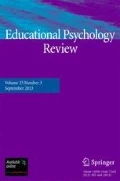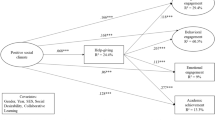Abstract
Why do some students avoid seeking help in the classroom when they need it? When students do not seek the help they need, they put themselves at a disadvantage for learning. We discuss how students' personal motivational characteristics relate to their avoidance of help seeking. In particular, we discuss our work regarding perceived academic and social competence and achievement- and social-goal orientations. We also discuss how various dimensions of the classroom context relate to help avoidance. Specifically, we discuss rules and norms of classrooms as well as our work examining the achievement goal structure and social climate of classrooms. We conclude by discussing how new developments in achievement goal theory distinguishing between approach- and avoidance-goal orientations might add to psychologists' understanding of help avoidance. We also consider how students' strivings for autonomy and different aspects of the social climate might be incorporated into theories of students' help avoidance behavior.
Similar content being viewed by others
References
Ames, C. (1992). Classrooms: Goals, structures, and student motivation. J. Educ. Psychol.84: 261–271.
Anderson, L. M., Stevens, D. D., Prawat, R. S., and Nickerson, J. (1988). Classroom task environments and students' task-related beliefs. Elementary School J. 88: 281–295.
Berndt, T. J. (1982). The features and effects of friendship in early adolescence. Child Devel. 53: 147–1460.
Brown, B. B. (1990). Peer groups and peer culture. In Feldman, S. S., and Elliott, G. R. (eds.), At the Threshold: The Developing Adolescent, Harvard University Press, Cambridge, MA. pp. 171–196.
Brown, B. B., Mory, M. S., and Kinney, D. (1994). Casting adolescent crowds in an relational perspective: Caricature, channel, and context. In Montemayor, R., Adams, G. R., and Gullotta, T. P. (eds.), Personal Relationships During Adolescence: Vol. 6. Advances in Adolescent Development, Sage, Thousand Oaks, CA, pp. 123–167.
Butler, R. (1998). Determinants of help seeking: Relations between perceived reasons for classroom help-avoidance and help-seeking behaviors in an experimental context. J. Educ. Psychol. 90: 630–644.
Butler, R., and Neuman, O. (1995). Effects of task and ego achievement goals on help-seeking behaviors and attitudes. J. Educ. Psychol. 87: 261–267.
Dillon, J. T. (1988). Questioning and Teaching: A Manual of Practice, New York Teachers College.
Dillon, J. T. (1990). The Practice of Questioning, Routledge, New York.
Dweck, C. S. (1986). Motivational processing affecting learning. Am. Psychol. 41: 1040–1048.
Dweck, C. S. (1996). Social motivation: Goals and social-cognitive processes. A comment. In Juvonen, J., and Wentzel, K. (eds.), Social Motivation: Understanding Children's School Adjustment, Cambridge University Press, New York, pp. 181–198.
Eccles, J., and Midgley, C. (1989). Stage/environment fit: Developmentally appropriate classrooms for early adolescents. In Ames, R. E., and Ames, C. (eds.), Research on Motivation in Education, Academic, New York, Vol. 3, pp. 139–186.
Eccles, J., Midgley, C., Wigfield, A., Buchanan, C. M., Reuman, D., Flanagan, C., and Maclver, D. (1993). Development during adolescence: The impact of stage-environment fit on young adolescents' experience in schools and families. Am. Psychol. 48: 90–101.
Eder, D. (1985). The cycle of popularity: Interpersonal relations among female adolescents. Sociol. Educ. 58: 154–165.
Elliot, A. J. (1997). Integrating the “classic” and “contemporary” approaches to achievement motivation: A hierarchical model of approach and avoidance achievement motivation. In Maehr, M. L., and Pintrich, P. R. (eds.), Advances in Motivation and Achievement, JAI Press, Greenwich, CT, Vol. 10, pp. 143–179.
Elliot, A. J. (1999). Approach and avoidance motivation and achievement goals. Educational Psychologist, 34: 169–189.
Elliot, A. J., and Church, M. (1997). A hierarchical model of approach and avoidance achievement motivation. J. Personal. Soc. Psychol. 72: 218–232.
Elliot, A. J., and Harackiewicz, J. M. (1996). Approach and avoidance achievement goals and intrinsic motivation: A mediational analysis. J. Personal. Soc. Psychol. 70: 461–475.
Good, T. L., Slavings, R. L., Harel, K. H., and Emerson, H. (1987). Student passivity: A study of question-asking in K-12 classrooms. Sociol. Educ. 60: 181–199.
Harackiewicz, J. M., Barron, K. E., Carter, S. M., Lehto, A. T., and Elliot, A. J. (1997). Predictors and consequences of achievement goals in the college classroom: Maintaining interest and making the grade. J. Personal. Soc. Psychol. 73: 1284–1295.
Harackiewicz, J. M., Barron, K. E., and Elliot, A. J. (1998). Rethinking achievement goals: When are they adaptive for college students and why? Educ. Psychol. 33: 1–21.
Hartup, W. W. (1989). Social relationships and their development significance. Am. Psychol. 44: 120–126.
Hicks, L. (1997). Academic motivation and peer relationships-how do they mix in an adolescent's world? Middle School J. 28: 18–22.
Karabenick, S. A., and Knapp, J. R. (1991). Relationship of academic help seeking to the use of learning strategies and other achievement behavior in college students. J. Educ. Psychol. 83: 221–230.
Karabenick, S. A., and Sharma. R. (1994). Seeking academic assistance as a strategic learning resource. In Pintrich, P. R., Brown, D. R., and Weinstein, C. E. (eds.), Student Motivation, Cognition, and Learning: Essays in Honor of Wilbert J. McKeachie, Lawrence Erlbaum Associates, Hillsdale, NJ, pp. 189–211.
Keating, D.P. (1990). Adolescent thinking. InFeldman, S. S., and Elliot, G. R. (eds.), At threshold: The Developing Adolescent, Harvard University Press, Cambridge, MA, pp. 54–89.
Kinney, D.A. (1993). From “nerds” to “normals”: Adolescent identity recovery within a changing social system. Sociol. Educ. 66: 21–40.
Maehr, M. L., and Midgley, C. (1996). Transforming School Culture, Westview Press, Boulder, CO.
Middleton, M. and Midgley, C. (1997). Avoiding the demonstration of the lack of ability: An underexplored aspect of goal theory. J. Educ. Psychol. 89: 710–718.
Midgley, C. (1993). Motivation and Middle Level Schools. In Pintrich, P. R., and Maehr, M. L. (eds.), Advances in Motivation and Achievement: Motivation and Adolescent Development, JAI Press, Greenwich, CT, Vol. 8, pp. 191–217.
Midgley, C., Kaplan, A., and Middleton, M. (in press). Performance-approach goals: Good for what, for whom, under what circumstances, and at what cost? Journal of Educational Psychology.
McCaslin, M., and Good, T. L. (1996). The informal curriculum. In Berliner, D., and Calfee, R. (eds.), Handbook of Educational Psychology, Macmillan, New York, pp. 622–670.
Myers, M., and Paris, S. G. (1978). Children's metacognitive knowledge about reading. J. Educ. Psychol. 70: 680–690.
Nelson-Le Gall, S. (1981). Help seeking: An understudied problem solving skill in children. Dev. Rev. 1: 224–246.
Nelson-Le Gall, S. (1985). Help seeking behavior in learning. In Gordon, E. W. (ed.), Review of Research in Education, American Educational Research Association, Washington, DC, Vol. 12. pp. 55–90.
Nelson-Le Gall, S., and Gumerman, R. A. (1984). Children's perceptions of helpers and helper motivation. J. Appl. Dev. Psychol. 5: 1–12.
Newman, R. S. (1990). Children's help seeking in the classroom: The role of motivational factors and attitudes. J. Educ. Psychol. 82: 71–80.
Newman, R. S. (1991). Goals and self-regulated learning: What motivates children to seek academic help? In Maehr, M. L., and Pintrich, P. R. (eds.), Advances in Motivation and Achievement: Vol. 7. Goals and Self-Regulatory Processes, JAI, Greenwich, CT, pp. 151–183.
Newman, R. S. (1994). Adaptive help seeking: A strategy of self-regulated learning. In Schunk, D., and Zimmerman, B. (eds.), Self-Regulation of Learning and Performance: Issues and Educational Applications, Lawrence Erlbaum Associates, Hillsdale, NJ, pp. 283–301.
Newman, R. S. (1998). Students' help seeking during problem solving: Influences of personal and contextual achievement goals. J. Educ. Psychol. 90: 644–658.
Newman, R. S., and Goldin, L. (1990). Children's reluctance to seek help with schoolwork. J. Educ. Psychol. 82: 92–100.
Newman, R. S., and Schwager, M. T. (1993). Student perceptions of the teacher and classmates in relation to reported help seeking in math class. Elementary School J. 94: 3–17.
Nicholls, J. (1990).What is ability and why are we mindful of it? A developmental perspective. In Sternberg, R., and Kolligian, J. (eds.), Competence Considered, Yale University Press, New Haven, pp. 11–40.
Paris, S.G., and Newman, R. S. (1990). Developmental aspects of self-regulated learning. Educ. Psychol. 25: 87–102.
Parker, J. G., and Asher, S. R. (1987). Peer relations and later personal adjustment: Are lowaccepted children “at risk”? Psychological Bulletin 102: 357–389.
Pintrich, P. R. (2000a). An achievement goal theory perspective on issues in motivation terminology, theory, and research. Contemp. Educ. Psychol. 25: 92–104.
Pintrich, P. R. (2000b). The role of goal orientation in self-regulated learning. In Boekaerts, M., Pintrich, P. R., and Zeidner, M. (eds.), Handbook of Self-Regulation, Academic Press, San Diego, CA, pp. 451–502.
Pintrich, P. R., and Schunk, D. H. (1996). Motivation in Education: Theory, Research, and Applications, Merrill Prentice-Hall, Englewood Cliffs, NJ.
Ryan, A. M. (1996). Interviews with adolescent students. Unpublished data.
Ryan, A. M., Gheen, M., and Midgley, C. (1998). Why do some students avoid asking for help? An examination of the interplay among students' academic efficacy, teacher's social- emotional role and classroom goal structure.J. Educ. Psychol. 90: 528–535.
Ryan, A. M., Hicks, L., and Midgley, C. (1997). Social goals, academic goals, and avoiding seeking help in the classroom. J. Early Adolesc. 17: 152–171.
Ryan, A. M., and Midgley, C. (1998). Changes in students' help seeking across the transition to middle school. Paper presented at American Educational Research Association annual meeting in San Diego.
Ryan, A. M., and Patrick, H. (in press). The classroom social environment and young adolescents' motivation and engagement in school. American Educational Research Journal.
Ryan, A. M., and Pintrich, P. R. (1997). Should I ask for help?: The role of motivation and attitudes in adolescents' help seeking in math class. J. Educ. Psychol. 89: 329–341.
Skaalvik, E. M. (1997). Self-enhancing and self-defeating ego orientation: Relations with task and avoidance orientation, achievement, self-perceptions, and anxiety. Journal of Educational Psychology 89: 71–81.
Skinner, E. A., and Belmont, M. J. (1993). Motivation in the classroom: Reciprocal effects of teacher behavior and student engagement across the school year. J. Educ. Psychol. 85: 571–581.
Trickett, E., and Moos, R. H. (1974). Personal correlates of contrasting environments: Student satisfaction in high school classrooms. Am. J. Commun. Psychol. 2: 1–12.
Urdan, T.C., and Maehr, M.L. (1995). Beyond a two goal theory of motivation and achievement: A case for social goals. Rev. Educ. Res. 65: 213–243.
Van der Meij, H. (1988). Constraints on question-asking in classrooms. J. Educ. Psychol. 80: 401–405.
Van der Meij, H. (1994). Student questioning: A componential analysis. Learn. Individual Diff. 6: 137–161.
Wentzel, K. R. (1989). Adolescent classroom goals, standards for performance, and academic achievement: An interactionist perspective. J. Educ. Psychol. 81: 131–142.
Wintre, M. G., Hicks, R., McVey, G., and Fox, J. (1988). Age and sex differences in choice of consultant for various types of problems. Child Dev. 59: 1046–1055.
Zimmerman, B. J., and Martinez-Pons, M. (1988). Construct validation of a strategy model of student self-regulated learning. J. Educ. Psychol. 80: 284–290.
Author information
Authors and Affiliations
Rights and permissions
About this article
Cite this article
Ryan, A.M., Pintrich, P.R. & Midgley, C. Avoiding Seeking Help in the Classroom: Who and Why?. Educational Psychology Review 13, 93–114 (2001). https://doi.org/10.1023/A:1009013420053
Issue Date:
DOI: https://doi.org/10.1023/A:1009013420053




